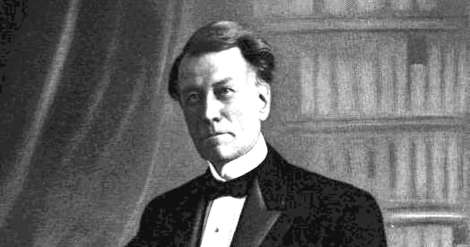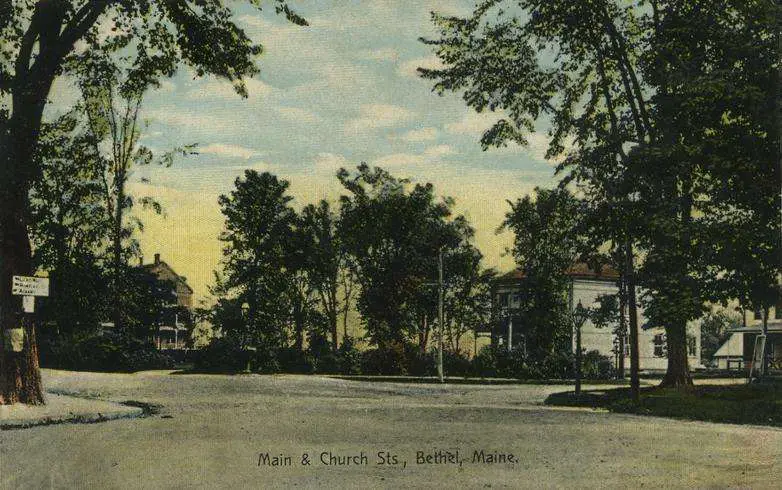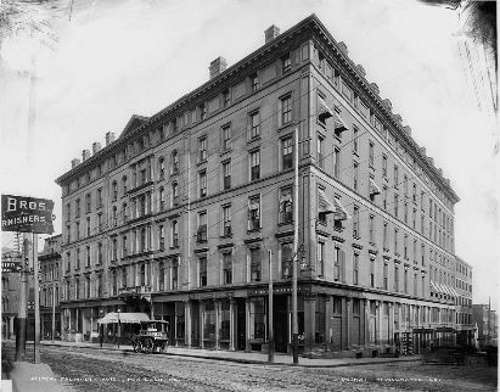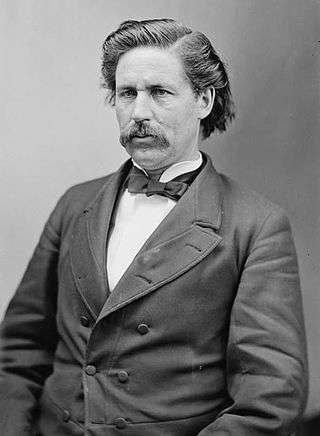Born in 1839, Enoch Foster might well be the prototype for a Maine politician of his era. Graduated from both Bates and Bowdoin colleges, during the Civil War he enlisted in the 13th Regiment of the Maine Volunteer Infantry. There he served under Brig. General Neal Dow. Dow would go on to become mayor of Portland and one of the state’s staunch temperance advocates.
But it wasn’t alcohol that would prove Enoch Foster’s undoing. It was women.
When he returned from the war, Foster attended law school in New York state. He clerked and studied under Reuben Foster, his cousin, a lawyer in Waterville, Maine. While in Waterville in 1864 he met and married Adeline Owen Lowe. The marriage lasted eight years, and the couple settled in Bethel near Newry, Enoch’s hometown.

Enoch Foster (from ‘Maine: A History,’ By Louis Clinton Hatch)
Enoch and Adeline had one son, but the boy passed away. Distraught, Adeline killed herself with a morphine overdose. It was at least her second attempt at suicide.
While his family life was in turmoil, Foster had not neglected his political life. In 1867 he had run for election and won the office of county attorney. He won re-election in 1870. He held numerous other offices in town, as well, serving as town clerk, postmaster and justice of the peace.
Rising Star
Approximately one year after his first wife died, Enoch Foster married his second wife, Sarah Chapman. Sarah came from a very prominent family in Bethel, Maine. Her grandfather named the town, and her wealthy father had built many buildings in it. The couple would eventually occupy her father’s home, now the home of the Bethel Historical Society.
In 1873, now a member of the prominent Chapman family, Enoch Foster was a force in town. He ascended to the state Senate and joined a group of men who started the Bethel Savings Bank. He served as an officer of the bank and helped to create the public water system.
In 1884, Foster’s political fortunes smiled on him once again. Gov. Frederick Robie appointed him to serve on the Maine Supreme Court for a seven-year term. By all accounts, Foster was an astute and able judge, his decisions usually finding majority support among his fellow judges. Gov. Edwin C. Burleigh reappointed him to a second seven-year term in 1891. In 1898, reappointment seemed to be his for the asking.
Foster had developed a reputation as a cheerless, pious judge. Cold, dignified, severe, Foster had informed Gov. Llewellyn Powers that he would serve another term. And Gov. Powers appeared amenable. But Foster’s dark side was finally about to catch up with him.
Disgrace Finds Enoch Foster
Polite biographies of Enoch Foster will note that he retired from the bench in 1898 at the close of his second term. Or that he stepped down after making a significant contribution to jurisprudence. But Enoch Foster, like many people who accumulate power, didn’t step away from anything. He left the court in disgrace.
Foster had long been the subject of many rumors. He was something of a dandy. Tall and well-dressed, he wore his hair long and had a theatrical bearing. He often strode about in a tall top hat.
Even his friends said he was too blunt and spoke too freely about his appreciation for beautiful girls. His enemies said he was a home-wrecker who had caused at least one divorce with his philandering. His behavior had very nearly become public during one divorce, but it was smoothed over when the case settled. As he got older, however, Enoch Foster became less discreet.

Main and Church streets, Bethel, Maine 1919
Things finally came to a head in 1894. Hiram Perkins set up shop as a barber at 30 Main Street in Bethel. Just a few short steps away was Enoch Foster’s home — in his father-in-law’s former house. Hiram had an attractive young daughter, E.L. Perkins. By 1896 Miss Perkins had caught the eye of Enoch Foster, though she was but 15 and he was in his 50s.
Enoch’s wife, whose health was never good, would later say it was but the latest example of Enoch’s misbehavior. She tried to persuade him to leave the girl alone. She asked his colleagues on the bench to convince him to stop seeing her.
William Penn Whitehouse, a fellow justice on the court, wrote to Foster. Whitehouse warned Foster his extramarital affairs were damaging his reputation. He asked him to stop, but Foster ignored the letter.
Showdown
Foster was a member of the Congregational Church in Bethel, as were all of his Chapman in-laws. In 1896, the church’s minister determined to take the lead in confronting Foster. The Rev. Israel Jordon, realizing that squaring off against Foster would cause a split in the church, signed a letter of resignation and submitted it. It would go into effect after he had confronted the judge. Rev. Jordon hoped his departure would allow the congregation to heal after what was sure to be a bruising showdown.
In February of 1896, Enoch Foster was twice observed at the home of Miss Perkins, the barber’s daughter. Rev. Jordon confronted him over it. Judge Foster pledged to stay away from the girl and her home. And in March he stood before the congregation, apologizing for his sinful behavior and asking forgiveness.

Falmouth Hotel in Portland, ca 1900
But Foster did not stay away from the girl for long. That very Easter he was seen entering the Perkins house, and the day after Easter he was seen with her at the Falmouth Hotel in Portland. That summer the church summoned him to explain himself again. Judge Foster did not accept the invitation, and the church ex-communicated him for, “Failure to answer charges of notorious conduct of a most scandalous nature.”
The Final Exposure
While the male political leaders of Maine were willing to look the other way from Foster’s behavior, the women in the state were growing disgusted. As 1897 drew to a close, the Women’s Christian Temperance Union threatened Foster. They demanded he leave the bench, and they offered to say nothing to damage his reputation if he went of his own accord.
Enoch Foster circled the wagons. He gathered endorsements from the county bar associations and collected hundreds of signatures from lawyers around the state. Any lawyer who might later do business in front of the judge had strong incentive to sign the petitions supporting him.
It’s not clear whether Foster thought people would overlook the matter or whether he expected the Women’s Christian Temperance Union to back down. Foster challenged the women to come forward and name names. They had kept their accusations opaque. Foster’s friends thought, as one newspaper put it, “there will be no woman who will have the grit to come forward with specific charges and support them with evidence.” They were wrong.
The Temperance Union had documented Foster’s travels with the young Miss Perkins, including hotel stays with her when she was just 15. By 1898 she had been sent away from Bethel and was studying music in Boston.
Grossly Immoral
In a public resolution forwarded to Governor Powers, the WCTU wrote: “…after careful deliberation we are forced to the painful conclusion, based upon reliable evidence, voluntarily brought to our attention, that the conduct of Judge Enoch Foster . . . in spite of the warnings of friends and expulsion from the church still continues to be so grossly immoral and notoriously scandalous as to demand the most public remonstration from all thoughtful and responsible citizens against his reappointment.”

Gov. Lewellyn Powers
Further, the Women’s Christian Temperance Union said they had even more evidence against Foster, evidence that might implicate others in public life, as well. Governor Powers was suddenly less sure about Enoch Foster’s future on the bench. He said publicly that he would be guided by the leading lawyers of the Maine bar as to Judge Foster’s reappointment.
Then, in March of 1898, as Foster’s term on the court was expiring, Gov. Powers reached his decision. He appointed William Folger of Rockland to take Foster’s seat on the court, as Foster had determined it was in his best interest to leave the court.
Enoch Foster After the Fall
The departure from the court did not end Enoch Foster’s career. He formed a law partnership with Oscar Hersey, a lawyer born in Freeport. They would practice as Foster & Hersey in Portland for nearly 15 years. The firm became one of the most prestigious in the state. In addition to performing work for numerous towns and cities in the state, the firm also had a role in several major cases.
The firm represented Rev. Sylvanus Hanscom in his bid to win the sheriff’s post in Hancock County in 1902. Hanscom claimed widespread fraud by election officials kept him from winning. Though ultimately unsuccessful, Hersey and Foster led a spirited fight to have the election overturned in Hanscom’s favor.
Foster & Hersey also represented James W. Brackett in his 1902 attempt to reclaim all of Peaks Island and much of downtown Portland on behalf of his family. The Bracketts had a claim on the title to the property dating to the 1600s. Foster’s role in the case, however, seems mainly to have been to inform the Brackett family that it had no hope of winning.
Foster then made a final appearance in the newspapers for his ownership of an unusually loquacious parrot named Bob Savage, which he had inherited from a sea captain. The article makes clear that despite his marital turmoil, his wife did not abandon Enoch Foster. She stayed with him until the end. He died in 1913.
This story about Enoch Foster was updated in 2023. #MeToo image By Wolfmann – Own work, CC BY-SA 4.0, https://commons.wikimedia.org/w/index.php?curid=64697079.
